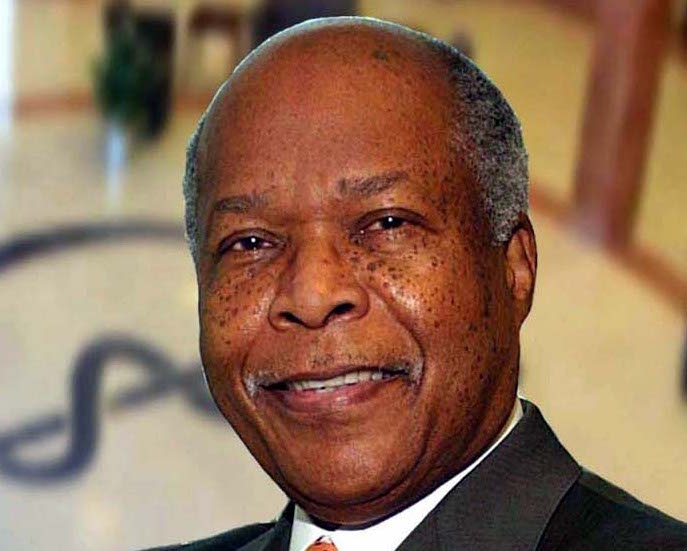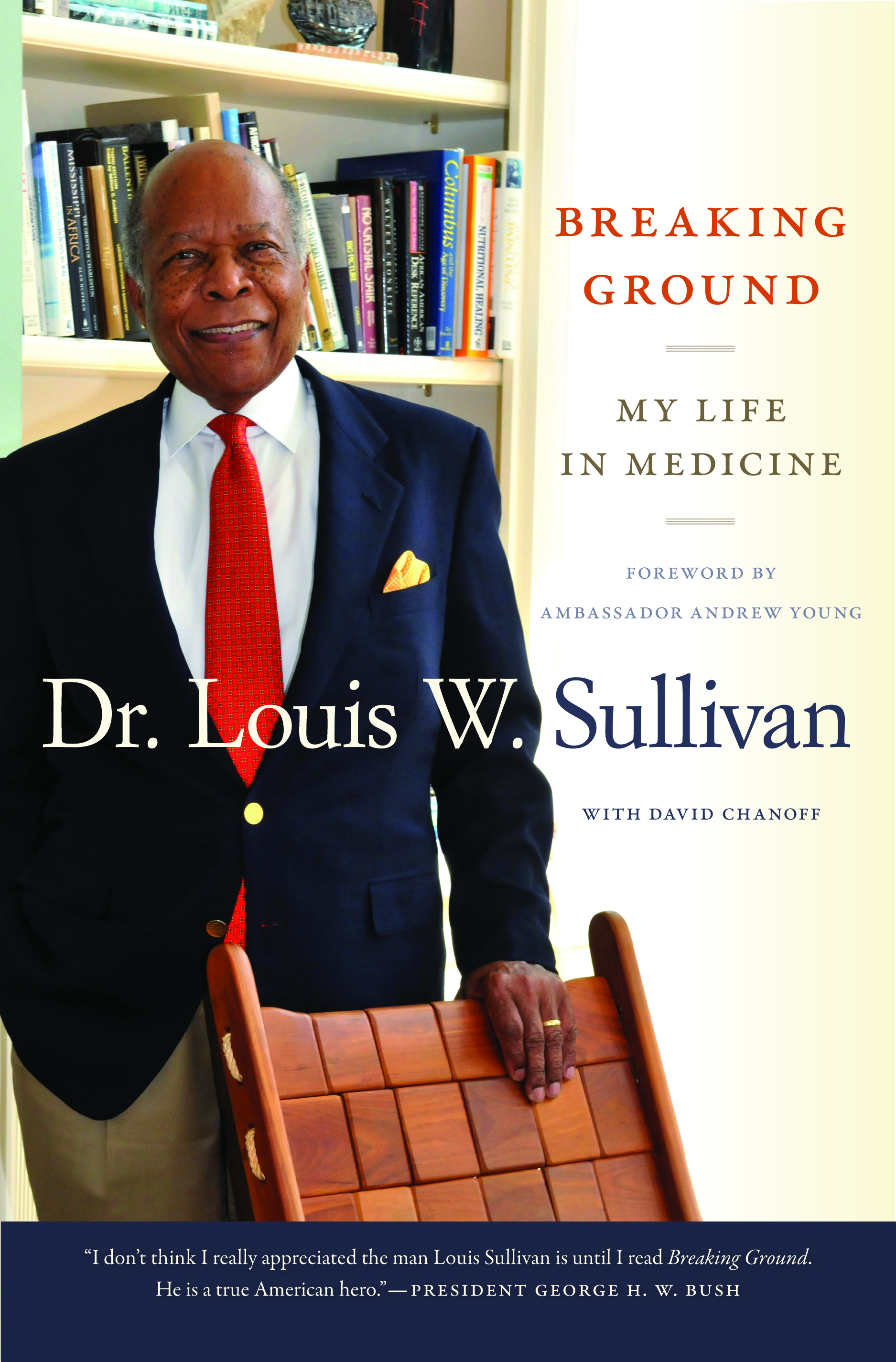Get Well Wednesday: Dr. Louis Sullivan
Get Well Wednesday: Dr. Louis Sullivan Answers Your Health Questions
Share the post
Share this link via
Or copy link

Louis W. Sullivan, M.D., is chairman of the board of the National Health Museum in Atlanta, Georgia, whose goal is to improve the health of Americans by enhancing health literacy and advancing healthy behaviors. He also is chairman of the Washington, D.C.-based Sullivan Alliance to Transform the Health Professions — a national non-profit organization with a community-focused agenda to diversify and transform health professions’ education and health delivery systems.
He served as chair of the President’s Commission on Historically Black Colleges and Universities from 2002-2009, and was co-chair of the President’s Commission on HIV and AIDS from 2001-2006. With the exception of his tenure as secretary of the U.S. Department of Health and Human Services (HHS) from 1989 to 1993, Dr. Sullivan was president of Morehouse School of Medicine (MSM) — the first predominantly black medical school established in the 20th Century — for more than two decades. On July 1, 2002, he retired and was appointed president emeritus.
Dr. Sullivan became the founding dean and director of the Medical Education Program at Morehouse College in 1975. The program became The School of Medicine at Morehouse College in 1978, admitting its first 24 students to a two-year program in the basic medical sciences. In 1981, the school received provisional accreditation of its four-year curriculum leading to the M.D. degree, became independent from Morehouse College and was re-named Morehouse School of Medicine, with Dr. Sullivan as dean and president.
Love Black America Web? Get more! Join the Black America Web Newsletter
We care about your data. See our privacy policy.
MSM was fully accredited as a four-year medical school in April 1985. In a study published in the Annals of Internal Medicine (June, 2010) Morehouse School of Medicine was ranked number one in social mission of all U.S. medical schools. Its graduates include former U.S. Surgeon General Regina Benjamin and former Meharry Medical College President Wayne Riley.
Dr. Sullivan left MSM in 1989 to accept an appointment by President George H.W. Bush to serve as secretary of HHS. In this cabinet position, Dr. Sullivan managed the federal agency responsible for the major health, welfare, food and drug safety, medical research and income security programs serving the American people.
A native of Atlanta, Dr. Sullivan graduated magna cum laude from Morehouse College in 1954, and earned his medical degree, cum laude, from Boston University School of Medicine in 1958. His postgraduate training included internship and residency in internal medicine at New York Hospital – Cornell Medical Center (1958-60), a clinical fellowship in pathology at Massachusetts General Hospital (1960-61), and a research fellowship in hematology at the Thorndike Memorial Laboratory of Harvard Medical School, Boston City Hospital (1961-63). He is certified in internal medicine and hematology, holds a mastership from the American College of Physicians and is a member of Phi Beta Kappa and Alpha Omega Alpha academic honor societies.
Dr. Sullivan is the recipient of more than 70 honorary degrees, including an honorary doctor of medicine degree from the University of Pretoria in South Africa.
He is the author of The Morehouse Mystique: Becoming a Doctor at the Nation’s Newest African American Medical School (with Marybeth Gasman, 2012, Johns Hopkins University Press) and his autobiography Breaking Ground: My Life in Medicine* (with David Chanoff, 2014, University of Georgia Press). You can read his essay on Enhancing Careers In The Health Professions HERE.

He is married to E. Ginger Sullivan, an attorney. The Sullivan’s have three grown children: Paul, a radiologist; Shanta, an actress and Halsted, a Harvard Law graduate and writer/producer for network television. Halsted was also a writer and co-producer of the popular NBC TV comedy, The Office.
Dr. and Mrs. Sullivan have two grandchildren, Paul Jr. and Brent Sullivan.
Dr. Sullivan answers your questions on Page 2.
What is all this talk about a resurgence of yellow fever? I read that it has appeared in Africa and there is no cure.
Yellow fever has appeared in the Democratic Republic of the Congo and there have been a number of deaths. It is caused by a virus and there is no cure. However, yellow fever can be prevented with a vaccine, which should be taken by anyone who is going to a country where there is yellow fever.
Yellow fever is not present in the United States. It was eradicated from the U.S. almost one hundred years ago by mosquito control and vaccination.
Should the people of Louisiana be concerned about Zika due to the recent storms and flooding?
Because of the presence of the Zika Virus in Miami, Puerto Rico and other Caribbean Islands, and the existence of the anopheles mosquito in southern states, there is the remote possibility of the spread of Zika in Louisiana. However, there is much greater danger to the health and lives of people in Louisiana from the massive flooding there.
Dr, I have ulcerative colitis and my medical insurance will not cover my Asacol or Desicol do you any outlook on a alternative or is there a cure on way?
I suggest that the patient with UC (ulcerative colitis) consult with their doctor about possible alternatives to their medications.
Good Morning, Doc. How do you feel about a full body cleanse? Are they really good for you?
There is no scientific study which shows any improvement in health status from so-called full body cleansers. A healthy diet, with fresh fruits and vegetables, copious intake of water, avoidance of tobacco and other intoxicating substances, regular exercise (walking, running, swimming, etc.) should help to improve and maintain your health.
What will Dr. Sullivan advice be to us young Black female doctors to get our African-Americans to get prostate and colon cancer testing done?
To improve screening rates for prostate cancer among African-American males, educational brochures about prostate cancer are available. Advocacy groups, such as PHEN (Prostate Health Education Network) conduct educational sessions around the country. There is also the prostate@realmencookfoundation.org where more information is available over the internet.
For colon cancer prevention and detection, an annual medical check-up is recommended for individuals aged 40 years or older. There is a simple test for blood in the stool, which may indicate the possible presence of colon cancer (though other conditions, such as hemorrhoids can result in the presence in blood).
But, the test recommended by the American Gastroenterological Society is a colonoscopy at age 40 and every five years thereafter, to detect and remove polyps and any early, localized cancers. Emphasizing the real benefits from testing for colon cancer is necessary to get people to do these tests.









